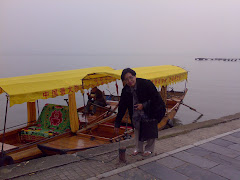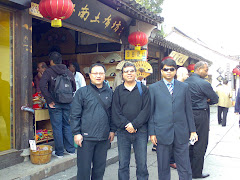THE FILES I MENTIONED HERE ARE NOT MERELY FROM MY OWN WRITINGS, BUT QUITE A NUMBER I QUOTE FROM THE SEMINARS I ATTENDED FOR DEVELOPING COUNTRIES OFFICIALS.
USUALLY, THE LECTURERS GIVEN US SOME HANDOUTS WHICH I THINK QUITE IMPORTANT FOR OFFICIALS OF THE DEVELOPING COUNTRIES AND THE LDCs, ESPECIALLY THOSE WHO ARE LESS FORTUNATE TO ATTEND THE SEMINARS WITH THE TOPICS ALIKE. SO HERE ARE SOME OF THE MATERIALS WHICH I DEEM WILL BE BENEFICIAL FOR ALL OF MY COLLEAGUES FROM ALL OF DEVELOPING NATIONS TO LEARN ABOUT.
AS OFFICIALS OF DEVELOPING NATIONS, WE HAVE TO LEARN AND WORK HARDER IN THE SMARTEST WAYS IN ORDER TO COMPETE IN GLOBAL ARENA. MANY SUCCESSES TO ALL OF YOU.
BEST REGARDS, NENENG TARIGAN (
n_tarigan@yahoo.com)
Dr. Chen Qi, Director of CEVTC and Dr. Detlef Kotte, Senior Official of UNCTAD, at the opening ceremony of the Seminar on Globalization and Industrial Transfer, Wuhan, PRC, October 2008
CHINA EXPERIENCE IN FOREIGN DIRECT INVESTMENT: As quoted from the presentation of Mr. Luo Shifan, during the Seminar on Globalization and International Industry Transfer, held in Wuhan, China, 2008, sponsored by MOFCOM (Ministry of Commerce China) and UNCTAD (United Nations Conference on Trade and Development), Organize by : CEVTC (China Europe Vocational Training Centre). For those who want to learn how China could make use optimally the foreign direct investment in her country; this paper is worth reading.
REGIONAL ECONOMIC COOPERATION by Mr.Sun Yuan Jiang, Department of Trade and Economic Affars, Ministry of Commerce, PRC, presented for the Seminar on Economic Globalization International Industry Transfer, 2008. Mr. Sun is trying to highlight the balance in the globalization effects towards developing countries and the need for regional economic cooperation.
Mr. Sun Yuan Jiang
INDONESIA ECONOMIC RECOVERY PROGRAMS: a country paper in power point format, presented by: Neneng Tarigan, participant of the Seminar on Economic Globalization International Industry Transfer, held in Wuhan, China, 2008.
SAVING, INTERNATIONAL CAPITAL AND ALL THAT: by Ugo Panizza, Senior Economic Affairs Officer, UNCTAD. October 2008. His presentation will give you some understanding about capital flows around the world, the balance of payment and the Neo Classical Theory etc. I strongly recommend you to understand his brilliant thought, since this topic was written during the world economic crises that hit and begin in USA. I wish you could meet Mr. Panizza in person and discuss the matter with him.
COMMODITY PRICES AND THE TERMS OF TRADE: by Alfredo Calcagno, Senior Economic Affairs Officer, UNCTAD. October 2008. His presentation will give you some understanding about the opportunities and challenges in the world commodity market, terms of trade in developing countries, etc.
Dr. Alfredo Calcagno
CURRENT DEVELOPMENT OF INDUSTRIAL CLUSTER IN CHINA AND ITS UPGRADING: by Dr. Feng Kui, October 2008. Since most part of his presentation was written in Chinese, I am unable to give a clear picture about his presentation. However, as it is publicly known, China is very successful in developing its special economic zones and industrial estates. China began the establishment of the SEZs and industrial estates in early 1970s mostly at the coastal sides of the country and this bring China to the level of success as we can witness today.
For more information please visit:
http://www.4shared.com/document/lPTnD0md/Industrial_Cluster_by_Mr_Feng_.html
THE THREE STRATEGIES OF CHINA IN INDUSTRIAL TRANSFER: by Mr. Tang Hua, from Hubei Department of Commerce, PRC, October 2008. This is a highly recommendable reading material for developing countries officials to observe how the industrial transfer could work effectively, based on balance and mutual benefit for the involving parties.
For more information, please visit:
http://www.4shared.com/document/I7GZiq29/Three_Strategies_of_China_for_.html
MILLENIUM CHALLENGE ACCOUNT: This presentation paper, content of information on Bush administration efforts in encountering global economic challenges. As a reference; this paper is quite useful in understanding government policies at certain circumstances, included during a transition period from a superpower country like USA. The outline of the paper among others covered general information on:
- The MCA which is according to the then administration will “reward nations that root out corruption, respect human rights, and adhere to the rule of law... invest in better health care, better schools and broader immunization... [and] have more open markets and sustainable budget policies, nations where people can start and operate a small business without running the gauntlets of bureaucracy and bribery.”
- The promotion of economic freedom.
- Etc.
For more information, please visit: http://www.4shared.com/document/Tj3pzrns/MCA.html
FINANCING OF INVESTMENT IN DEVELOPING COUNTRIES AND THE OUTCOME OF FINANCIAL REFORMS: by Alfredo Calcagno, Senior Economic Affairs Officer, UNCTAD. October 2008. His presentation will give you some understanding about alternative approaches for financing investment. This policy paper is highly recommended for Policy Makers who intended to increase investment in the developing countries.
For more information, please visit:
http://www.4shared.com/document/J-s6T7h3/Finance_for_Investment.html
EFFECTIVE UTILIZATION OF RECOURCES IN THE PROCESS OF INDUSTRY TRANSFER AND SUSTAINABLE DEVELOPMENT IN CHINA: by Prof. Luo Shifan, November 2008, Wuhan, PRC. Learning from the experiences and lessons from China and some other developing countries.
For more informatiom, please visit:
http://www.4shared.com/document/24XueJ-S/Effective_Utilization_of_Resou.html
SUCCESSFUL EXPERIENCE AND LESSONS IN CHINA's REFORMS, OPENING-UP AND DEVELOPMENT: Training material for the Seminar on Globalization and International Industry Transfer, held in Wuhan, China, 2008. This paper elaborates: (1) How reform and opening-up is being carried out; (2) Why should we reform and opening-up; (3) How to reform, opening up and development; (4) Open the door to attract foreign investment; and (5) What is the essence of reform and opening up. Learning from China with her reformation programs, I consider this paper as worth reading.
For more information, please visit:
http://www.4shared.com/document/x_U8HCie/EXPERI1.html
GROWTH DIAGNOTICS: by Ugo Panizza, Senior Economic Affairs Officer, UNCTAD. October 2008. His presentation will give us some understanding about the idea that there may be many reasons why an economy does not grow, but each reason generates a distinctive set of symptoms.
For more information, please visit:
http://www.4shared.com/document/jFUy6FF6/Growth_Diagnostics1.html
or visit Mr. Ugo Panizza's sites:
Dr. Ugo Panizza
EXTERNAL FINANCING AND DEBT SUSTAINABILITY: by Ugo Panizza, Senior Economic Affairs Officer, UNCTAD. October 2008. His presentation will give you some understanding about History and recent trends; External versus domestic debt; The risks of sovereign finance and how to make debt safer; Domestic policies; International policies; Building domestic bond markets; More on debt sustainability; How to deal with debt crises; and Policy conclusions. Well, Ugo has a very sharp and clear analytical point of views on various subjects related to macro economic and financial policies. His writings and presentations will bring us to a further understanding in economic policies in a more critical and accountable manner. He is a person who is not only generous with his knowledge and wisdom, but at the same times a very nice and friendly guy to communicate with.
For more information about the above mentioned topic, please visit:
http://www.4shared.com/document/LZP7hjOn/debt_china.html
AID AND DEBT RELIEF: by Ugo Panizza, Senior Economic Affairs Officer, UNCTAD. October 2008. His presentation will give you some understanding about Aid and Growth; and Some issues with the current aid architecture. This material is also worth reading.
For more information, please visit:
http://www.4shared.com/document/h1d7BdOY/ChinaODADR.html
CURRENT TRENDS AND POLICY CHALLENGES IN THE WORLD ECONOMY: by Alfredo Calcagno, Senior Economic Affairs Officer, UNCTAD. October 2008. His writing about this issue is so invaluable.
For more information, please visit:
http://www.4shared.com/document/2gscQ1zw/Current_trends.html or ask for Mr. Calcagno advice at
Alfredo.calagno@unctad.org
THE EMERGENCE OF CHINA AND DEVELOPMENT STRATEGIES: by Jörg Mayer, Senior Economic Affairs Officer, UNCTAD. October 2008. At this presentation paper, Dr. Mayer gives an in-depth overviews on: China’s increasing importance in global economic relations; China’s growing economic weight (The rationale for reserve accumulation; Changes in the composition of China’s exports; China’s impact on other countries’ exports); China’s economic integration and changes in the terms of trade: and Implications for development strategies.
For more information, please visit:
http://www.4shared.com/document/9swQtWJa/Chinas_emergence.html
Dr. Jörg Mayer
POLICY SPACE: WHAT, FOR WHAT AND WHERE: by Jörg Mayer, Senior Economic Affairs Officer, UNCTAD. October 2008. Aim here: address how to use existing national policy space, or even enlarge it, without roll-back or opting out of international commitments. Perspective: policy space debate needs to look at macro-economic, structural and financial market issues, in addition to trade.
For more information, please visit:
http://www.4shared.com/document/MsM6lsNE/Policy_space.html
MACROECONOMIC CHALLENGES FOR RESOURCE-RICH ECONOMIES: by Jörg Mayer, Senior Economic Affairs Officer, UNCTAD. October 2008. The issue here is: Why are some resource-rich economies (Australia, Botswana, Norway, etc) more successful than others? Malthus, Ricardo etc feared that economic growth would come to a halt because of limitations on the availability of natural resources; Between 1870 and 1913, some resource-rich countries (Australia, Scandinavia, US) outperformed resource-poor countries and became affluent and technologically highly developed countries; After World War II scepticism about resource-based development rooted in forecast of a secular decline in global primary-commodity demand and prices; While, more recently, emphasis that natural resources may have an adverse impact on economic performance even in period of strongly rising commodity prices. This brilliant thought and an in-depth comprehensive study of Dr. Mayer, is really worth reading and recommendable for academics and policy makers.
For more information, please visit:
http://www.4shared.com/document/D1V6xqNb/Resource-rich_economies.html
Zannou (Benin) looked very enthusiastic with the substance
THE ROLE OF REGIONAL COOPERATION IN DEVELOPMENT: by Jörg Mayer, Senior Economic Affairs Officer, UNCTAD. October 2008.The number of trade agreements notified to the WTO has increased rapidly since the early 1990s – new agreements are bilateral rather than plurilateral.Most new trade agreements are Free Trade Agreements.Most new trade agreements are between countries from different regions and at different levels of development. The trade-offs of North-South FTAs is one of many examples. Motivation for North-South FTAs: belief that multilateral trade agreements are moving too slowly in improving access to developed-country export markets or harmonizing rules in areas such as IPRs, investment, etc. North-South FTAs have two important features: Firstly, They involve reciprocal commitments, eliminating the special and differential treatment granted to developing countries through other agreements (e.g. PTAs); Secondly, They make the reduction in market access barriers conditional on liberalization in areas such as intellectual property rights (IPRs), investment, government procurement, competition policy, sanitary and phytosanitary regulations, environmental and labour standards, regulations concerning capital flows, etc. This paper is really debatable and highly recommendable for officials involved in international trade negotiation forum.
For more information, please visit:
http://www.4shared.com/document/X50ZfGf9/Regional_cooperation.html or at
http://www.4shared.com/document/6CP_jDio/Regional_cooperation.html
STIMULATING THE DYNAMIC FORCES OF MARKETS: a presentation paper by Jörg Mayer, Senior Economic Affairs Officer, UNCTAD, delivered at the Seminar on "Addressing the Opportunities and Challenges of Globalization for Development", Wuhan, China, October 2008. This paper among others covered an overview on: Innovative entrepreneurs as drivers of economic development; the importance of industry for development: and the strategies for industrial development (Attracting foreign direct investment and Open-economy industrial policy).
For more information, please visit:
http://www.4shared.com/document/xyWbY_y4/DynForces_2008.html
The participants would also enjoy some Chinese cultural performances. Here is the slide showing the participants' expressions.















































































0 comments:
Posting Komentar